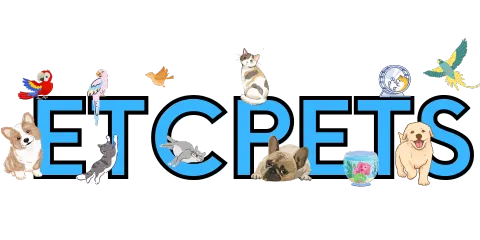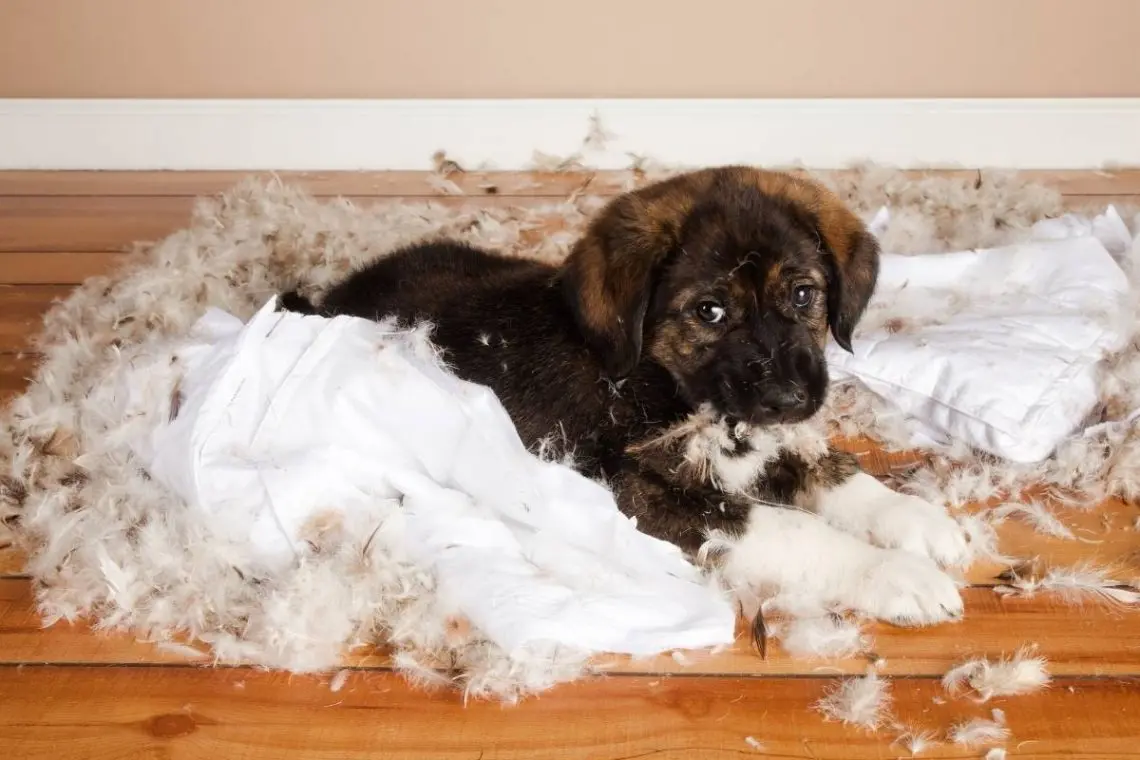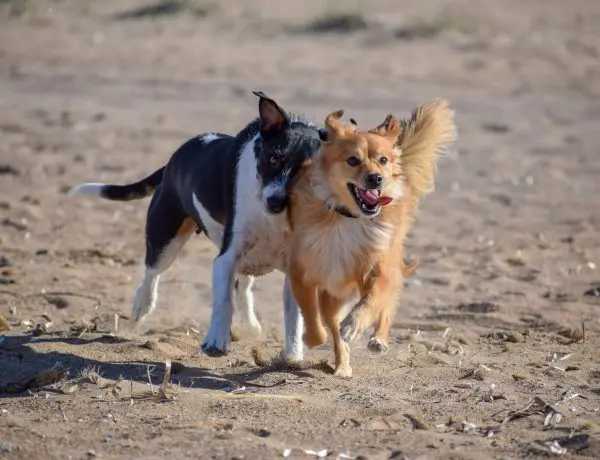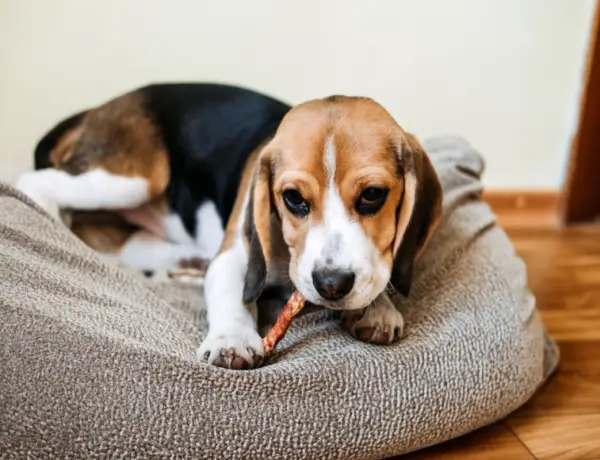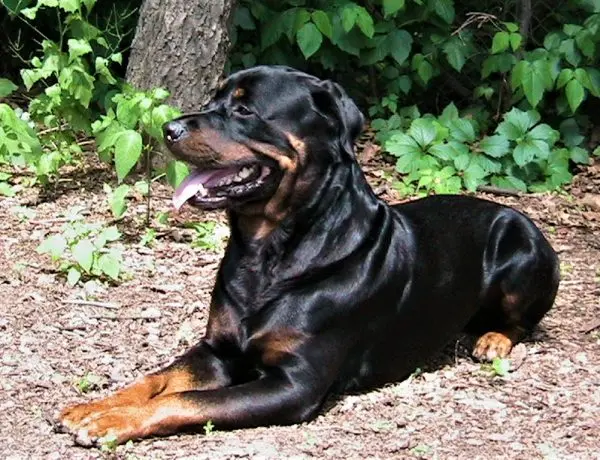You just brought home an adorable puppy, yet only a few days (or hours) later, you find yourself cleaning up puppy pee, fighting off those needle-sharp teeth, and wrestling the remote control out of your pup’s mouth – and now you’re wondering if you just made a huge mistake! It’s common at this point to wonder if puppy training will get easier as time goes by.
The answer to whether puppy training gets easier is yes…and no! While many of the frustrations of training a puppy do, in fact, get much easier as your pup matures, those frustrations can sometimes be replaced by different training challenges.
Throughout puppyhood, it is important to remember that your cute pup has only been on this earth for a few weeks, and everything they are experiencing is brand new to them. Take a deep breath and picture that pup as a wonderful, calm, and obedient adult dog that is your best friend and constant companion. Remember all of the reasons you had for bringing home that little bundle of joy in the first place. Now, after your head has cleared a bit, let’s talk about some of the challenges facing all new puppy owners.
Table of Contents
Is It Normal to Regret Getting a Puppy?
There are many reasons for getting a new puppy, and some of those reasons bring about more feelings of regret than others. If you are trying to fill a space in your home left by a recent loss of an older dog, the feeling of regret about a rambunctious puppy that acts nothing like your previous dog can be expected. Give it some time…it often takes a while to bond with a new puppy, especially if you are still reeling from the loss of another dog.
Over time, memories of the difficulties of puppyhood often fade, and those few months of frustration fade from our minds as they are replaced by many years of dog-owning enjoyment. It’s easy to think that your new puppy is SO much more trouble than your previous dog was, and while this might be true, most of the time, it is not… it’s just that those challenging months are far outnumbered by the years of good memories. Provided you have done your research and chosen a puppy with a temperament and energy level appropriate for your family and lifestyle, with some time and a lot of patience, that pup is likely to mature into a wonderful family member.
Early Challenges of Puppyhood
Housebreaking
The first thing on most new puppy owners’ minds is housebreaking their new pup. Unfortunately, doing this correctly involves a lot of patience and supervision. However, housebreaking is definitely one of the puppy challenges that does get easier with time!
You will need to plan for at least three to four weeks of continually supervising your puppy if you want to be successful at housebreaking your pup. If your puppy was raised in a clean environment and given the opportunity to learn good potty manners from the time they gained mobility, your job might be a little bit easier. If your pup was not given a separate area to potty away from their sleeping and eating area, you might have more challenges.
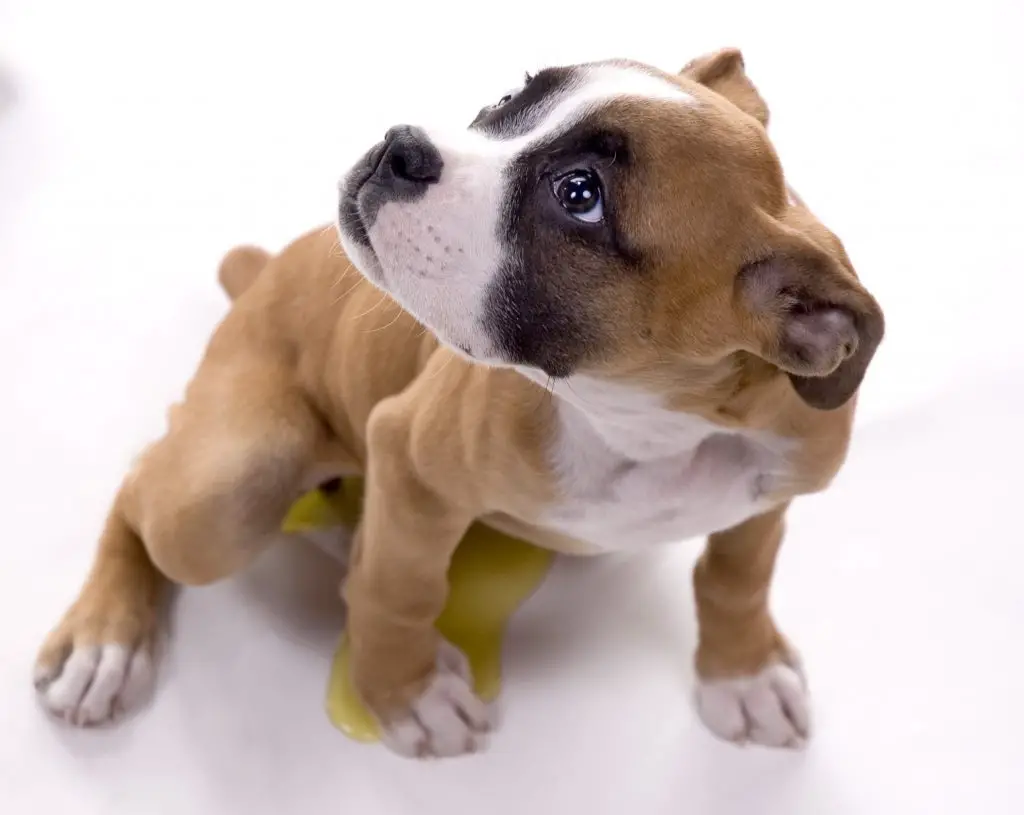
Puppies at 8 weeks of age have tiny bladders and need to relieve themselves OFTEN! This is where that constant supervision on your part comes in. It is exhausting, and you will likely spend a LOT of time outside with your puppy. However, those few weeks of hard work on your part are well worth it!
Make it your goal the first couple of weeks to not allow your puppy to have ANY accidents in the house. This is done by taking them out every 45-60 minutes that they are awake and encouraging them to go potty outside. I recommend that you do this with them on a leash, so they learn that they are out there just to go potty and they don’t get distracted by playing or sniffing around. Once they have relieved themselves, you have about 30 minutes where your pup can have a little bit more freedom, as you know that a potty accident at that time is unlikely.
If you are unable to supervise your dog at any time, confine them. A crate is a fantastic housebreaking tool which has added benefits during puppy training and throughout your dog’s life – so I highly recommend crate training all puppies! It is up to you whether you use a solid airline-approved crate or a fold-able wire crate; a solid crate is easier to clean, while a wire is easier to move and store.
After you’ve had a couple successful weeks with LOTS of trips outside (and trust me, you’ll be spending many hours of your day outside with your pup allowing them to go potty), it is time to reduce the outside trips a bit in hopes of your puppy having an accident or two.
Yes, you read that right, you WANT them to have a couple of accidents…but you MUST catch them in the act. If you see your pup start to squat to potty, give a quick loud “NO,” scoop them up, and immediately take them outside. As soon as you are outside, tell them in a kind and encouraging voice to “go potty” (or whatever words you choose). If they finish pottying outside, give them a lot of praise (and a treat if you would like).
If you do not catch your dog in the act of pottying inside, you must DO NOTHING other than quietly clean up the mess. Rubbing your dog’s nose in it or yelling when you find the mess does not teach your dog that pottying in the house is wrong – you are only teaching your pup that you can’t be trusted, as you punish them unfairly for things they don’t understand.
The objective of this exercise is that first, we want to create a habit of your pup going potty outside; this is done by multiple trips outside, so many trips that they never really have an opportunity to go to the bathroom inside. The next step is teaching them that there is a consequence for relieving themselves indoors; that’s where catching them in the act and startling them with a quick “NO” comes in. At this same time, you are also reinforcing the good behavior of pottying outdoors.
It is also important to watch your dog for cues that they may need to relieve themselves. Any change in your dog’s focus is a cue. For instance, if your dog is playing with his toys and then suddenly stops playing to wander off, that would be an excellent time for you to suggest a trip outside!
Housebreaking is definitely one of the more challenging times of puppyhood, but if you are consistent and put in the work early on, it is an area of training that gets MUCH easier with age!
Puppy Biting
Puppy teeth are sharp, and puppies tend to put their mouths on everything, including us! Dogs weren’t blessed with thumbs as humans were, so they use their mouths not only for eating but also for playing and carrying things.
All puppies bite; it’s just what puppies do. Unfortunately, puppy biting is a huge source of frustration for new owners and one that often brings a lot of emotion with it.
I’ve had many clients over the years that were devastated by their puppies biting them. Owners often complain that their 12-week old puppy is “aggressive” or “mean.” They get their feelings hurt, and can’t understand why their puppy is biting them, when all the owner wants to do is love and take care of the pup. You can take some comfort in knowing that it is incredibly rare for a pup that young to indeed be aggressive, and that the fact that your puppy is biting you has absolutely nothing to do with how much they do or do not love you. It’s just a natural part of puppy development.
That being said, it’s a part of puppy development that we definitely want to train them out of! Again, this is going to take patience and dedication on your part. The first step to getting that biting under control is to give your puppy plenty of things that they can bite and chew on. Anytime they bite you, tell them “NO,” but do it with a calm and firm energy, and offer them a toy they can put their mouth on.
Redirecting your pup to something they are allowed to bite is an essential part of the training, but it’s not the only part. You also want to let the pup know that while play-biting on another dog is something that is often okay (unless the other dog yelps to tell them they’ve taken it too far!), it is never allowed on humans.
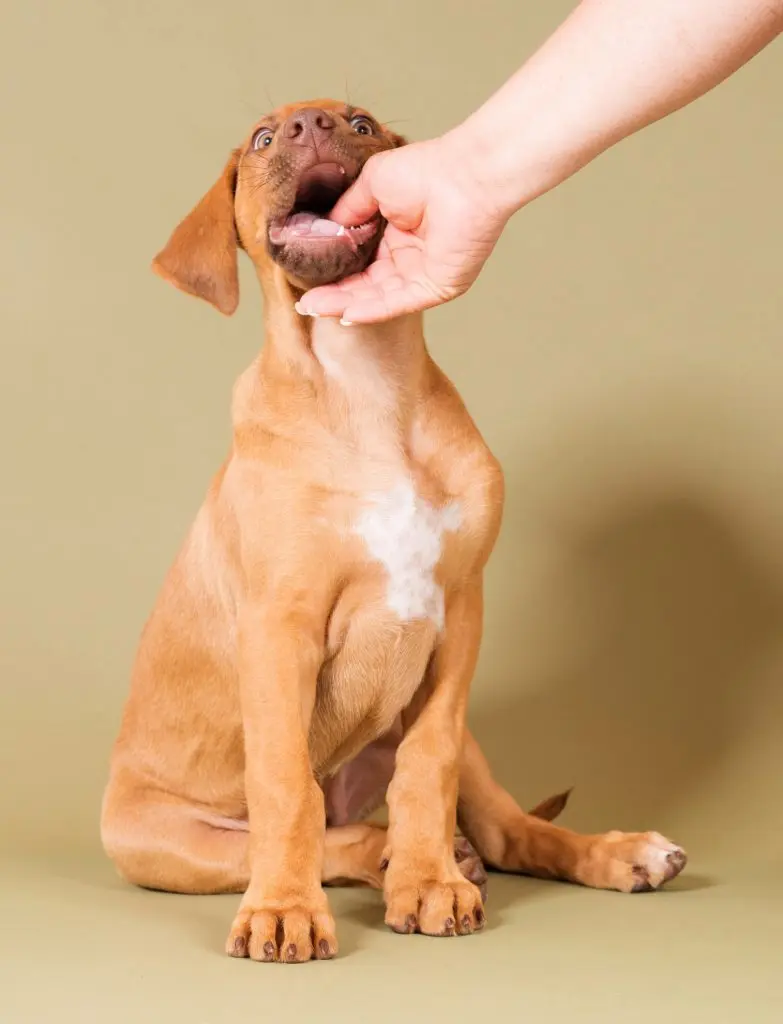
There are many different methods out there that deal with this problem, but I will share with you the one I’ve had the most success with. When a puppy bites my hands, I calmly “bite” them back with my hand while telling them “NO.” By “bite” them back, I mean that I make it unpleasant for the pup to have my hand in their mouth. This is not to be done in an abusive or mean way at all. I just either press my finger or thumb against their tongue or roll their lips over their own teeth (so if they bite down, they bite their lip rather than my finger), or possibly just put more of my hand in their mouth than they wanted (for a large dog). The whole time, my body language is very relaxed and calm, and all I’m saying is “no” in a stern, calm voice.
As soon as the pup stops the biting, I relax my hand, tell them “good” (also in a calm, but more pleasant voice) and give them another chance to make the right decision – which in this case is to sniff or lick my hand, or stop engaging with my hand entirely.
This method works, but it does not work immediately. Actually, no method works immediately for puppy biting. Puppy biting is a natural thing, and for your pup to learn that it is not acceptable in the environment they now live in, it will take time and consistency on your part. Stay calm and consistent, and over time, the puppy biting will diminish. Also, those razor teeth that pups are born with do eventually fall out! Between three and six months of age, your pup’s baby teeth will be replaced with much larger (although not nearly as sharp!) adult teeth…which is often a much-appreciated development!
Remember to STAY CALM as you are correcting your pup for biting. Many people, and especially children, get frantic when the puppy bites them. They will often squeal or try to jerk their hand away and then try to keep their hands away from the pup. While this is a natural instinct on the human’s part, it really looks like an invitation to play from your puppy’s perspective. Remaining calm, consistent, and in control of the situation is always the best approach when it comes to curbing puppy biting.
If you try the above suggestion with mild success, but your pup is just insistent on biting, it’s time for you to completely redirect your puppy’s focus. After you’ve gotten in at least one good correction for biting, give your pup something else to do. Maybe it’s time for them to go outside for a potty break or a game of fetch. Or, perhaps your puppy is just overtired and not wanting to miss anything by taking a nap – that is an excellent time to offer him or her a tasty chew toy in their crate to work on before they fall asleep. Don’t ever set yourself up for failure – if your pup is not in the mood for quiet cuddling time, don’t force the issue! Instead, make it your idea to suggest a more appropriate activity for the mood and energy level they are experiencing.
Puppy biting is another area that almost always gets easier as your pup gets older. In fact, some pups just outgrow the biting stage when the adult teeth come in, even if their owners don’t directly address the problem. However, if you don’t address the problem, you run the risk of it becoming a habit even after adult teeth arrive. Not to mention the fact that the time with your young pup is much more enjoyable if you are not covered in Band-aids.
Stealing and Chewing on Items
As I mentioned before, puppies bite. Puppies also chew! Chewing is a natural dog behavior, and it is even more prevalent in puppies as they are teething. Watching your pup lying on the floor at your feet happily chewing on his Kong Puppy Toy or Nylabone Chew Toy is peaceful and relaxing, but watching them chewing away at your cell phone or favorite shoes is infuriating! Remember, in your pup’s eyes, they’re doing exactly the same thing.
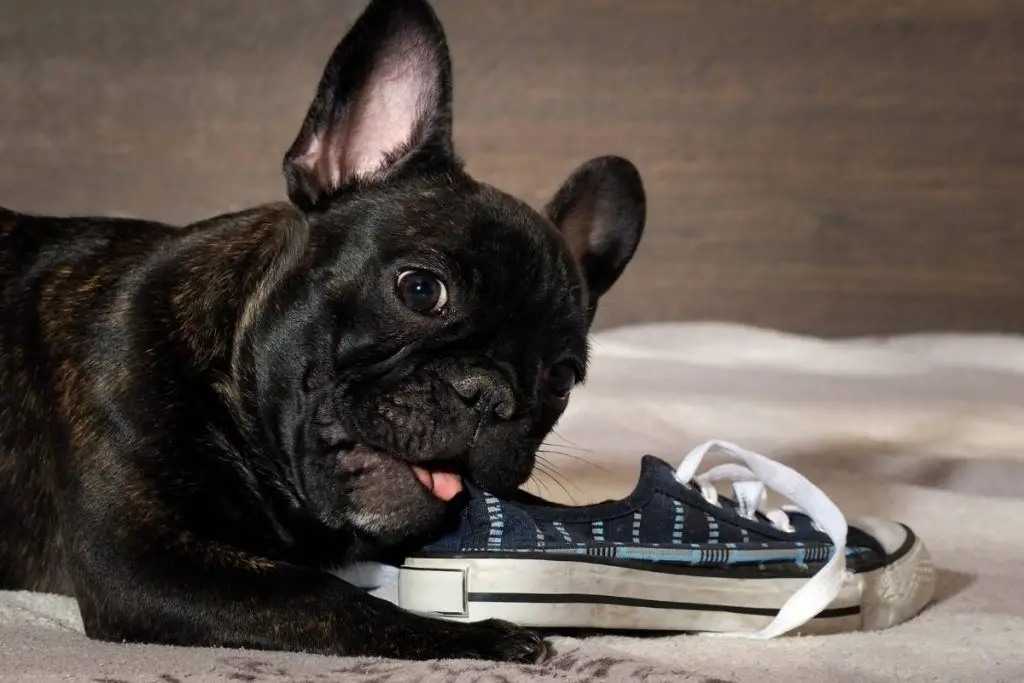
Just like with housebreaking, the key to keeping your sanity during puppy chewing is supervision. Your pup should not ever be left unattended with anything they are not allowed to chew on. Again, a crate or puppy pen can come in very handy during this time of your pup’s life. Anytime you cannot supervise them, they need to be confined away from anything that is unsafe for them to chew on.
Remember, those puppy teeth are maturing and then falling out as the adult teeth develop and come in. This can be an uncomfortable time for your pup, just as teething is for human children. You must provide your puppy with safe things for them to sink their teeth into.
Not all dogs have the same chewing habits, which is often frustrating for owners. Over the years, I have had dogs that were relentless, destructive chewers – ones that would seize any opportunity to steal and destroy pretty much anything within their reach. Yet, some of my other dogs rarely touched anything other than their own toys, even when given much more freedom. Because of this, it is important to be mindful of your particular pup’s chewing behavior.
Puppy-proofing your house is essential. Place all things that are dangerous to your pup (or important to you) out of your pup’s reach unless you are right there to monitor the puppy at all times. This can be frustrating and exhausting, especially for people with small children in their home. But remember, kids’ toys look just like puppy toys to your dog! Close the doors to your kids’ rooms or use baby gates, put shoes away in closets, and put all remote controls and other electronics up high and out of your pup’s reach until your they have proven to you that they will not chew on them.
If you catch your dog reaching for something inappropriate, a quick stern “NO” or perhaps a quick blast of air from a Pet Corrector can be a valuable teaching tool. But, if your dog has already taken something and started chewing on it, your moment for correction has passed.
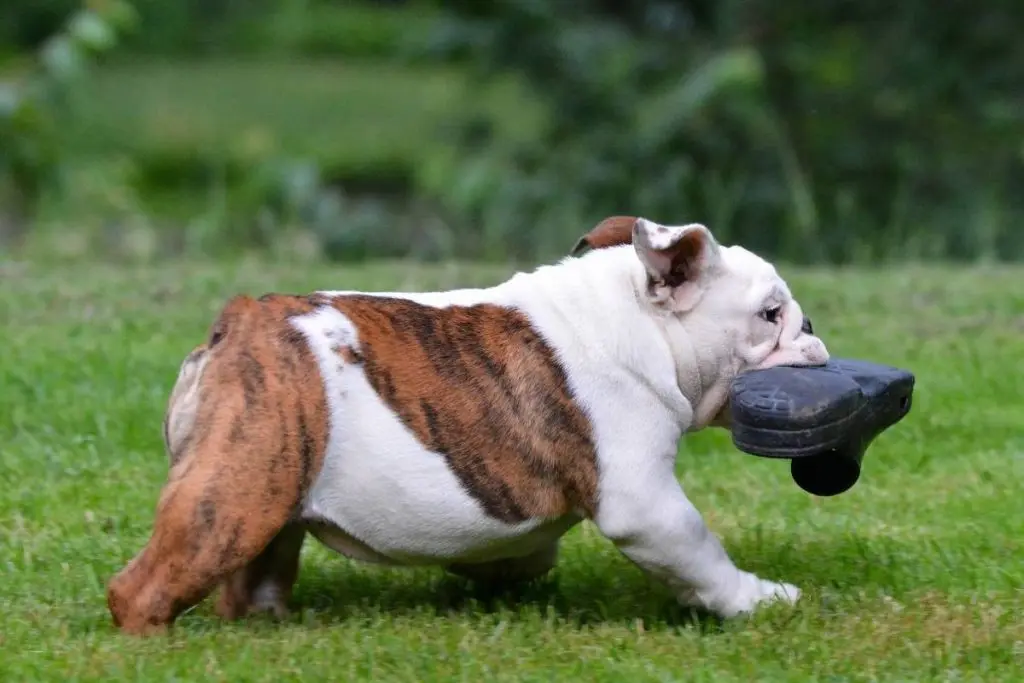
That last sentence is important enough to repeat – if your pup has already taken something and started chewing on it, your moment for correction has passed! Instead, I recommend keeping your tone of voice and body language very positive as you approach your pup – saying something such as “What do you have? Let me see that. What a smart puppy you are to have found that!” If your pup allows you to approach without running away from you, calmly take the item from the puppy as you praise them extensively. If it is an item that won’t injure them and that perhaps they can chew on for a bit, give it right back to them. Then, a moment later, approach the same way, take the item again (with the same calm, praising words) and trade them for a toy of their own. If the item they have is dangerous to them, you will need to do the trade-off right away.
This method is challenging for owners – especially when it involves something valuable! But, if you scold your pup and try to forcefully grab the item away, you are only teaching your puppy that they need to run faster and hold on tighter to anything they steal if they want to keep it. By calmly trading out for something of equal or better value, you are building trust with your pup and will eliminate the stealing behavior much quicker.
While sometimes puppies chew on things they shouldn’t just because they enjoy chewing, they often learn that stealing and chewing on things gets them attention from you. Although you may see the attention you give them as negative attention, they see it as a fun game to get you to pay attention to them and chase them around the house…which will inevitably increase their bad behavior.
Many dogs outgrow their chewing and stealing behaviors as they mature. Again, sometimes this happens with no training or even with improper training from the owner. However, waiting for that maturity to happen is often dangerous to the dog and very expensive for you as the owner – not to mention incredibly frustrating!
On the other hand, some dogs are incessant chewers their whole lives. If you find yourself with one of these destructive chewers, that “puppy proofing” of your house may need to continue for several years of your dog’s life. As with most bad behaviors, physical exercise, supervision, and mental stimulation can help curb this behavior in many cases.
What Areas of Puppy Training Become More Difficult?
At the beginning of this article, I mentioned that while some areas of puppy training do get easier, other parts can become more challenging. As your puppy matures, they see the world differently. Different things become more interesting to them, more distracting, and sometimes even more frightening. Once your pup has received their vaccinations, enrolling them in a training class with other puppies can be a valuable option! Your puppy will gain exposure to other dogs, people, and environments. You are also likely to get moral support from other puppy owners experiencing the same frustrations you are.
Another issue that causes some areas of puppy training to become more difficult is that your puppy is continually learning, and that means they are also learning from any mistakes you might be making in training! If you are inconsistent with your training and your expectations of your pup, they are learning when they have to pay attention to you – and when they don’t!
While housebreaking and puppy biting often get easier as your pup matures, there are a couple of problems that often become more pronounced with time.
Coming When Called
Most very young puppies are happy to come to you whenever you call them. From about 8-12 weeks of age, you are by far the most exciting thing in their life! Food and fun almost always come from you, and your pup probably isn’t being exposed to many other new environments or distracting items. If you carefully build on that desire they have to be near you, it might be possible to avoid this challenge. However, if you are like most puppy owners, there will come a time (usually around 12-16 weeks old) when your pup will learn that the rest of the world has more exciting things to offer than you do.
Having your puppy ignore your request to come to you can be incredibly frustrating! This is actually one of the most frequent complaints I hear from owners during our training sessions. My first question to them is, “What are you calling your puppy to you for?” Suppose you call your puppy away from something they find fun and exciting (like chasing lizards in the backyard), and you then ask them to do something they find boring or unpleasant (such as going in their crate for bedtime). In this case, it is simple to see why your pup has opted not to come when called.
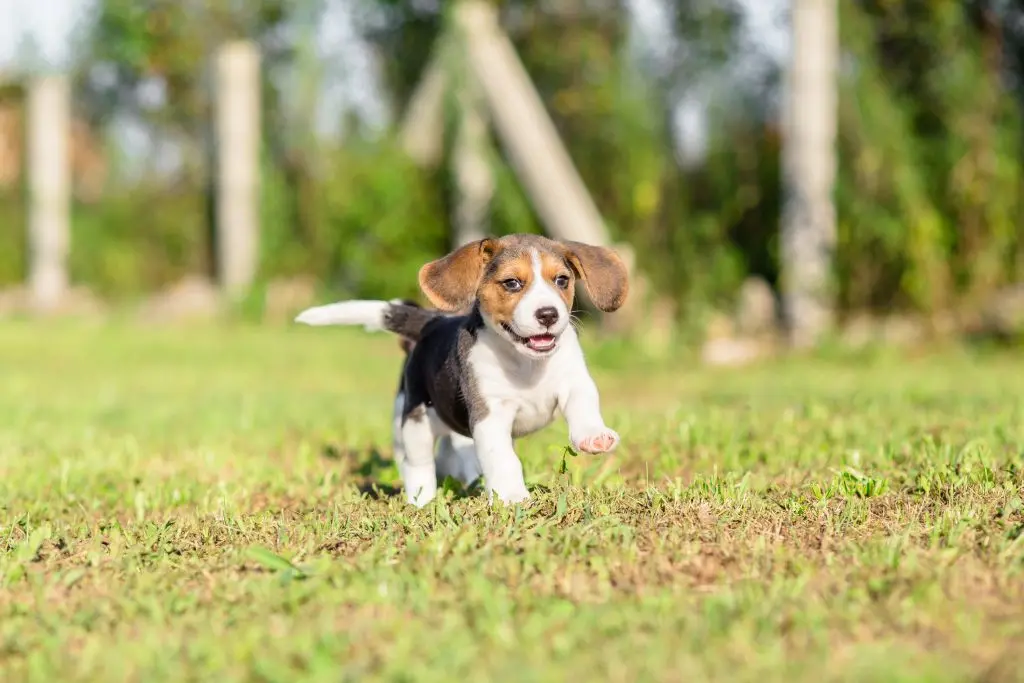
Unfortunately, this is an area of puppy training that often becomes more difficult as your pup grows up. As they mature and get braver about exploring other areas of your home and your yard, they often find more and more things that they find fun and exciting. At that same time, if you have not proven yourself to continually be a huge source of fun and entertainment, they are learning that coming to you is often the end of the fun they were having.
This problem can be solved if you remain diligent about keeping the act of coming to you ALWAYS extremely positive and MUCH more fun than anything else they could have possibly been doing. Treats and toys can help with this! EVERY time you call your pup to you, they should be rewarded! A treat or other food reward works for most puppies, but if your dog doesn’t like treats, you can use a game of fetch or tug-o-war, or possibly some physical attention and praise (only if your pup actually enjoys that though). You must have your pup practice this behavior of coming to you many times throughout the day (like 20-50 times each day!). And, many of those times, call them to you for a treat and then allow and encourage them to go right back to what they were doing before you called them to you.
This will not only teach your pup that coming to you is very rewarding, but it is also not the end of the fun they were having before coming to you.
Leash Walking
Leash walking can be challenging for very young puppies, as many of them are uncomfortable being restrained by a collar and leash at first. However, if you are taking your pup out to potty on a leash, this behavior will usually go away quickly and be replaced by a puppy that will either follow you around happily on a leash or at least a pup that you can easily control physically on a leash….for a little while! And, then that cute puppy gets bigger and braver, and the world becomes much more exciting!
Pulling on the leash is usually a behavior that owners start complaining about when their pup gets to be about 6 or 7 months old. Many times those complaints are not because the leash pulling just started. Instead, the complaints happen because that small pup is now a large pup and not as easily restrained by the leash as they were when they were tiny. If you are struggling with leash pulling on your older puppy (7 months or more), take a look at this article and video.
Conclusion and Support
You are not alone in your frustration with puppy training! Even as an experienced dog trainer of 25 years, I have my moments of extreme frustration when it comes to training my own young puppies. The good news is that they do eventually grow up – and in the meantime, they’re pretty darn cute…especially when they’re sleeping!
As I said at the beginning of this article, take a deep breath and remember why you got a puppy in the first place. Nothing worth having is ever easy! Be patient and remember that we expect human children to go through 18 years of life and 12 years of school before we consider them adults – yet we often expect puppies to behave like grown-up dogs in just a few months. Take your time and carefully TEACH your pup what you expect from them in a patient and fair and consistent way.
Enjoy each and every moment that you have with your new pup, even those challenging moments…in the end, they’re never with us long enough, and every second we get to share our lives with them is precious!
